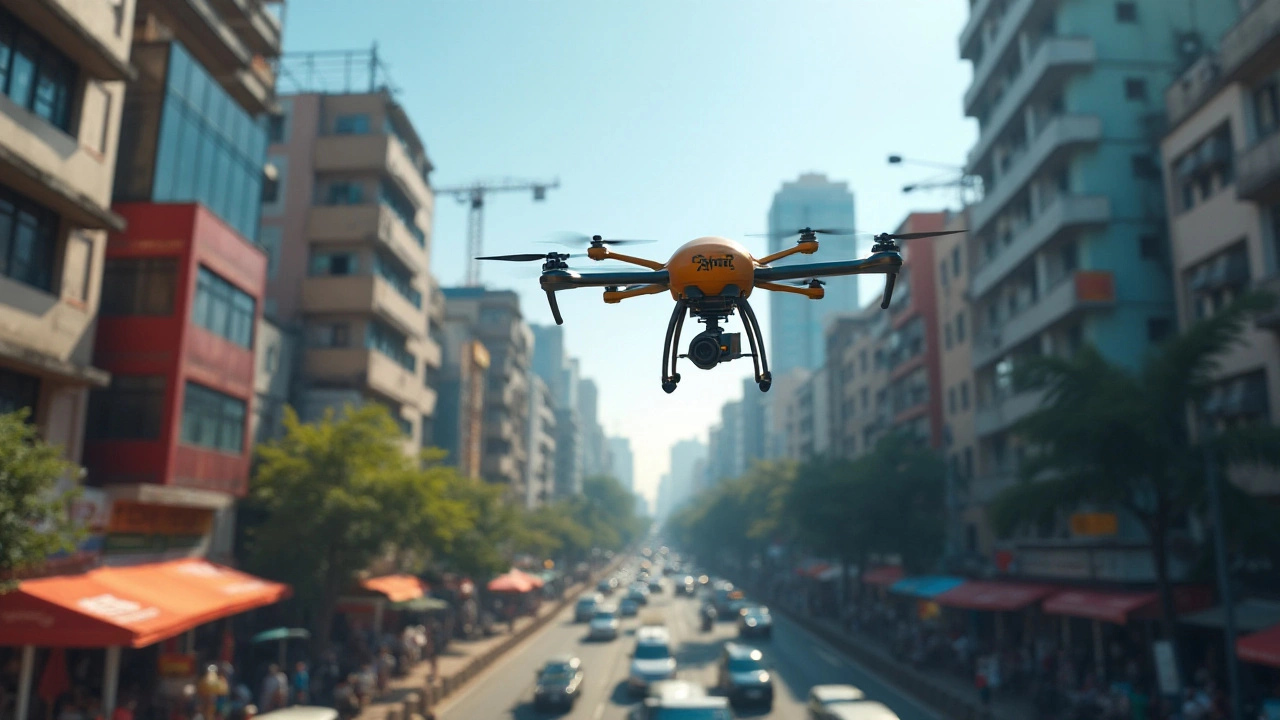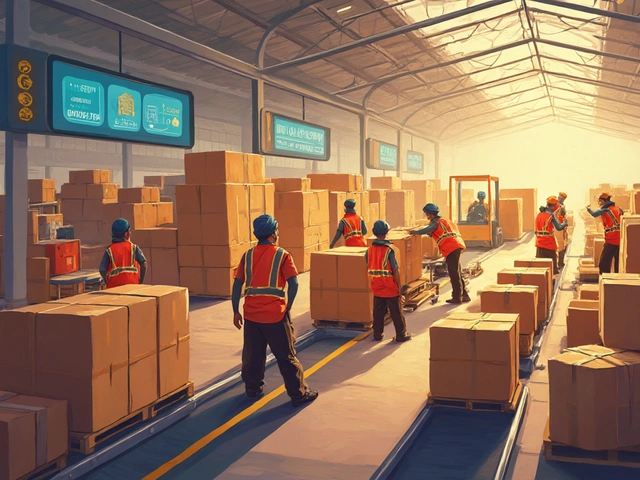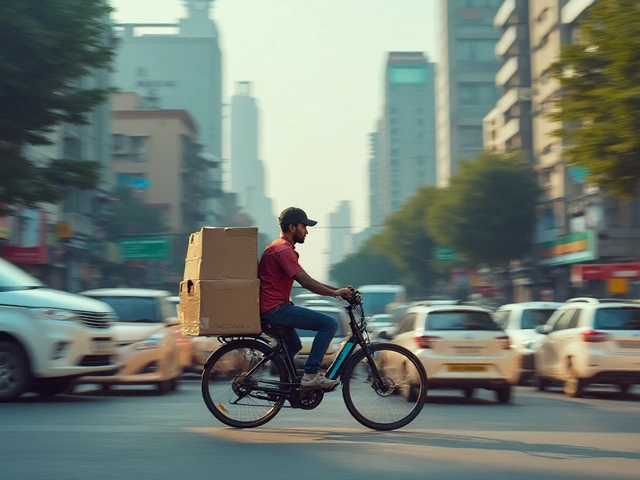The concept of express delivery, once a mere luxury, has now embedded itself into the fabric of modern commerce. In a world that thrives on immediacy, the demand for packages that travel at lightning speed continues to grow. But the question remains: Does express delivery truly deliver on its promises, or is it just another marketing gimmick?
To explore this, you need to look beneath the surface of what makes express delivery tick. From sophisticated algorithms to global networks, each parcel’s journey is more complex than it seems. However, while cutting down transit times, these services also introduce a set of unique challenges.
For businesses and consumers alike, understanding the dynamics of express services can lead to better decision-making and an overall enhanced experience. This article equips you with the knowledge to make informed choices in a world where knowing when your package will arrive can be as critical as what’s inside.
- The Rise of Express Delivery Services
- How Express Delivery Works
- Advantages of Using Express Delivery
- Challenges and Concerns
- Comparing Express Delivery Providers
- Tips for Successful Express Delivery
The Rise of Express Delivery Services
The journey of express delivery services from a niche luxury to an industry cornerstone is a tale of technological advancement and evolving consumer expectations. Once upon a time, sending a package overnight was a costly endeavor, reserved for businesses with deep pockets or emergencies deserving an inflated price tag. However, the digital revolution and e-commerce explosion changed the landscape dramatically. Services like Amazon Prime championed the cause, promising two-day, and sometimes even same-day, fast shipping to millions of customers.
The logistics required to promise and deliver on these package shipping promises are immense. Behind the scenes, a symphony of logistics, technology, and planning ensues to ensure that parcels arrive on doorsteps as quickly as consumers wish. Algorithms calculate the fastest routes, while vast warehouse infrastructures ensure that inventory is as close to consumers as possible. Not surprisingly, the world’s biggest names in delivery have become titans in their own right, dominating a market that is worth billions. According to the 2023 report by the International Express Association, the global express delivery market is predicted to reach $560 billion by 2028, showcasing its ever-growing importance.
Among the notable pioneers was Louis DeJoy, who once remarked, "The logistics industry is the hidden engine of the modern economy."
"Rising consumer expectations mean we must deliver faster and more efficiently than ever before,"further highlighting the pressure and innovation driving the sector. As with all trends, the rise was not without its challenges. The intense demand for speed forced companies to rethink traditional logistics frameworks, investing in technologies such as artificial intelligence, robotics, and even drone courier services.
A decade ago, same-day delivery seemed an unattainable dream, yet today, it’s become a market standard. This was made possible through extensive collaboration and infrastructure development among courier giants, local postal services, and emerging tech companies. It's an intricate dance, tightly choreographed and often relying on seamless hand-offs between air, sea, and ground logistics. On the streets of major cities, dispatchers on bicycles, motorcycles, and vans weave through traffic, ensuring urban customers receive their deliveries with minimal delay. The infrastructure must match the promise, so distribution hubs have grown larger, smarter, and more efficient. In this new era of hyper-connectedness, the expectation that an item will be on your doorstep almost immediately has woven itself into the consumer psyche, reshaping buying habits and setting new standards across industries.
How Express Delivery Works
Understanding how express delivery operates can demystify the rapid movement of parcels from one part of the world to another. At the heart of these services lie sophisticated logistics frameworks and state-of-the-art technology. The workflow begins even before you hand over your package. As you make the booking, an intricate digital process is initiated, where your parcel is assessed, weighed, and labeled for its journey. These initial steps are crucial because they determine the route and speed of delivery.
Once the package is prepared, the journey continues through a well-coordinated network of transportation methods. The choice of transport—be it trucks, planes, or even drones—is dependent on several factors, including distance, package dimensions, and shipping urgency. At the center of these operations are vast distribution hubs that serve as the nerve points for sorting and transferring parcels. Imagine these hubs as the beating hearts of courier services, where parcels arrive in bulk and are efficiently directed towards their next destination.
Key to the success of express delivery is advanced tracking technology. The journey of a single package can be monitored in real-time using barcodes and GPS systems. This transparency not only benefits customers but also helps service providers optimize routes and prevent delays. According to a report by DHL, “Innovations in tracking are transforming the delivery landscape, providing unparalleled accuracy and customer assurance.” Such technology ensures that any hitches in the process can be addressed promptly, minimizing downtime.
Modern Challenges and Innovations
Despite the complexity and efficiency of express delivery, several challenges persist. Weather remains an unpredictable adversary, capable of bringing the swiftest operations to a halt. In response, companies are increasingly relying on AI-driven forecasting to preemptively reroute packages. Another interesting development is the use of machine learning to predict surges in demand and adjust capacity accordingly, illustrating a proactive approach to mitigating common hurdles faced in fast shipping.
In urban areas, last-mile delivery presents its own set of difficulties. Traffic congestion can hinder the timely delivery of packages, a persistent issue addressed by innovative solutions like automated lockers and drone deliveries. These strategies not only bypass traditional constraints but also pave the way for environmentally conscious delivery options, thus contributing to the sustainability goals of many companies. As these technological advancements in express delivery continue to evolve, they promise to redefine our expectations and experiences with global shipping.

Advantages of Using Express Delivery
There's no denying the thrill of seeing the express delivery option when checking out your latest online purchase. In a time where instant gratification rules, express delivery brings multiple advantages to individuals and businesses alike. One of the most significant benefits is the speed. With express services, packages often travel at half the time compared to standard shipping methods. This is particularly useful for businesses that rely on timely deliveries to maintain customer satisfaction. Imagine a coffee shop running out of coffee beans or a tech store needing immediate stock replenishment. Speedy shipping can make the difference between retaining a loyal customer and losing business.
Another advantage of express delivery is the reliability it offers. Given the premium price, courier companies investing in express services often employ advanced technology and logistics to ensure packages are delivered on time. GPS tracking and real-time updates offer peace of mind, allowing recipients to plan their day around package arrivals. Some services even boast a 95% success rate in on-time delivery within promised windows. This level of reliability is invaluable for businesses shipping time-sensitive products, like perishables or urgent documents.
Express delivery also affords greater flexibility. Many service providers offer solutions that cater to specific customer needs. These include same-day or overnight delivery options, catering to both personal and business requirements. Consider the healthcare sector, where immediate delivery of medical supplies or laboratory samples can be crucial. The tailored services provide not only speed but also convenience that can adapt to various scenarios. According to a statement by FedEx, they emphasize, "Our global network of dedicated planes reaches major cities overnight, across continents, enabling businesses to expand their horizons to international markets."
Moreover, express delivery can enhance a company's competitive edge. In today’s rapid-paced market, consumers often lean towards businesses that offer faster shipping. By meeting these expectations, companies can differentiate themselves from competitors who only offer standard delivery times. Key benefits include fostering customer loyalty, increasing sales, and boosting customer satisfaction. In fact, a survey revealed that 80% of customers are more likely to shop again with a retailer that offers a premium shipping option after a positive delivery experience.
For personal situations, express delivery can be a life-saver. Last-minute gifts, forgotten passports, or even urgent supplies during emergencies can all benefit from these services. Besides speed and reliability, there are intangible benefits such as peace of mind, knowing that items can reach far-flung places quickly and safely. The convenience of having such options readily available adds a layer of security and assurance that’s hard to measure but immensely valuable.
Challenges and Concerns
Navigating the world of express delivery isn't always as straightforward as it seems. With packages flying around the globe at unprecedented speeds, several challenges loom large over this convenience-laden landscape. One of the most significant hurdles is the environmental impact, which often goes overlooked amidst the excitement of rapid delivery. Express delivery systems frequently rely on air transportation to meet tight deadlines, and this mode of transport has a considerably higher carbon footprint compared to terrestrial options. The environmental cost of these services can pose a serious concern for individuals and companies aiming to commit to sustainability.
Another crucial issue revolves around the logistical complexities inherent in the task of managing a vast network of deliveries. Ensuring each parcel reaches its intended destination without delay or damage requires a seamless chain of operations and communication. Even minor disruptions, such as adverse weather conditions or traffic jams, can snowball into significant delays, undermining the promise of reliability and efficiency. These disruptions also test the flexibility and responsiveness of courier services, which must adapt rapidly to maintain the integrity of their offerings.
Security is yet another area where express deliveries face challenges. With the popularity of online shopping surging, so too does the opportunity for package theft, commonly coined as ‘porch piracy.’ Couriers must improve their security measures, such as package tracking and secure delivery options, to protect customers’ purchases. Retailers and couriers alike are exploring technologies like smart lockers and timed deliveries to counter these threats. However, these innovations are still evolving and present their own logistical challenges.
"Innovation has brought us new solutions to old problems, but it comes with its own set of challenges. To master the art of express delivery, we must walk the tightrope of speed and accuracy deftly," - Logistics Expert, John Larson.
Finally, customer expectations continue to evolve rapidly, and businesses must stay ahead of these changes to thrive. Customers now expect real-time updates and utmost transparency regarding their delivery process. Consequently, express delivery services are integrating sophisticated tracking systems and predictive analytics, raising the ante for operational accuracy. Fulfilling such expectations without compromising cost-effectiveness remains a formidable task.
To illustrate these points, consider some revealing statistics from industry reports:
| Challenge | Statistics |
|---|---|
| Environmental Impact | Air freight accounts for approximately 2% of global carbon emissions. |
| Logistical Delays | More than 12% of express deliveries experience delays due to unforeseen circumstances. |
| Package Theft | About 30% of online shoppers in urban areas report having had packages stolen. |
Conclusively, fostering a balanced ecosystem of package shipping requires addressing these myriad challenges. While express delivery offers unparalleled convenience, it is critical to recognize that the road to expedited delivery is not without its bumps. As consumers and industry insiders collaboratively navigate these challenges, the future of express delivery hangs in the balance, urging continuous adaptation and innovation.

Comparing Express Delivery Providers
Choosing the right express delivery provider can feel like finding a needle in a haystack, with numerous services promising the fastest shipping routes and top-notch reliability. The playing field is filled with giants as well as niche players, each catering to specific audience needs. So, how do you pick the right one? The key lies in weighing factors like cost, reach, reliability, and customer service.
FedEx and UPS are major players in the express delivery world, each offering a vast range of services. FedEx is particularly renowned for its overnight shipping option, regarded as one of the best in the industry. UPS, on the other hand, shines through with its comprehensive tracking system, sparing customers the ambiguity shell around 'where is my parcel?'. Both companies have extensive networks, making them ideal choices for international shipping.
Meanwhile, DHL provides another competitive alternative, mainly known for their international expertise. They often lead in terms of global reach, with their footprint in over 220 countries and territories. According to Logistics Management Magazine, DHL's infrastructure and logistics capabilities make it a go-to for many businesses partnering internationally. Moreover, their eco-friendly initiatives appeal to the environmentally conscious customers.
Kevin Higgins, a logistics analyst with SupplyChain 24/7, says, "The rise of e-commerce has reshaped consumer expectations, making the role of express delivery providers more crucial than ever. Providers are now investing more in technologies and service improvements to stay ahead in the race."
Amazon Prime Delivery is a newer player in the express delivery scene yet extremely impactful. The e-commerce behemoth has not just mastered the art of quick delivery but also seamlessly integrated it into their membership services, enjoying a vast logistical network that covers significant urban and suburban areas.
| Provider | Strength | Weakness |
|---|---|---|
| FedEx | Speedy delivery | Higher costs |
| UPS | Reliable tracking | Complex rate structure |
| DHL | International reach | Some regional delays |
| Amazon Prime | Integration with shopping | Limited to Amazon products |
So, while choosing the right express delivery service, one must assess their specific delivery needs. Are you a business needing to reach international customers? Or an individual seeking fast, predictable service within domestic borders? Your needs will dictate your choice, but understanding these providers' core strengths will help lay the foundations of a reliable selection.
Tips for Successful Express Delivery
Embracing the promptness of express delivery can make a remarkable difference in meeting deadlines and satisfying customer expectations. However, ensuring success in this fast-paced world requires planning and precision. First and foremost, always confirm the availability of express options during the checkout process. Some carriers might not offer swift services between certain destinations, and checking beforehand can save valuable time. Address accuracy is crucial; even a minor error can lead to delays when utilizing courier services. It's vital to double-check every detail, from the postal code to apartment numbers, to avoid any mishaps.
Invest in sturdy packaging materials that can withstand the rigors of travel. Remember that packages endure various handling stages, and durable packaging can prevent damage, ensuring contents remain intact. It's beneficial to label fragile items clearly and include any relevant handling instructions to guide the logistics personnel. An often-overlooked aspect is keeping track of carrier deadlines. Knowing cutoff times for express shipment ensures that your package makes it onto the right transport as scheduled. Lastly, always maintain open communication with your carrier. Should any issue arise, prompt contact can lead to immediate solutions, minimizing potential setbacks.
Leverage Technology and Tools
In today's digitally-driven era, utilizing technology can significantly enhance your express delivery experience. Several applications and platforms provide real-time tracking capabilities, a feature that can alleviate anxiety for both sender and receiver. With push notifications and alerts, you can stay informed about the package's journey, making it easier to anticipate its arrival window. Some platforms even allow customers to pinpoint specific delivery times, enhancing convenience and planning flexibility. A sophisticated understanding of data can also support logistics. Consider, for example, using historical delivery performance metrics to evaluate the reliability of different service providers. Savvy users can identify trends that pinpoint potential peak times or expected delays—knowledge that can be leveraged to streamline future deliveries.
"The secret of getting ahead is getting started," Mark Twain's words ring true here as adequate preparation maximizes express delivery effectiveness, ensuring seamless transactions and satisfaction for all parties involved.
Know Your Rights and Responsibilities
Understanding the terms and conditions of the package shipping service you're utilizing is imperative. Always read the fine print to grasp what your rights and responsibilities are concerning express delivery. This includes understanding the limits on liability and insurance options, which vary significantly between providers. Many carriers offer compensation or coverage in case of loss or damage, but these often require specific prerequisites to be met. Familiarize yourself with their claims procedure before sending out packages. Additionally, patience in sorting through customer service avenues can go a long way if ever there's a dispute. Many reputable companies maintain dedicated channels to swiftly address issues; knowing these contact points in advance could be beneficial during stressful situations. By staying informed and actively engaged, consumers and businesses alike can enjoy the full benefits of express shipping services efficiently.





